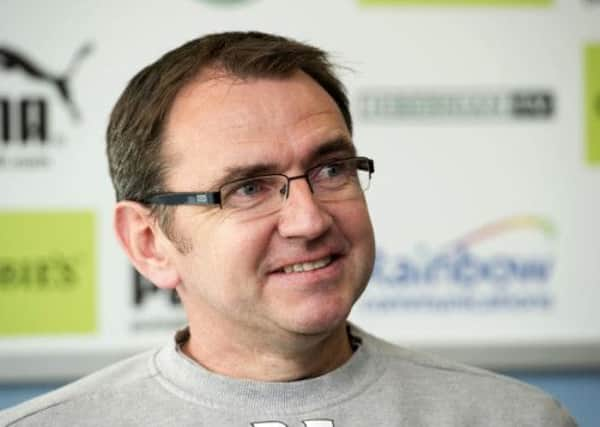Pat Fenlon worked hard with Leigh Griffiths


If the striker collects the PFA Scotland player of the year award tomorrow, then it will be proof that it has all been worth the effort, if the 27 goals he has scored to date have not already vindicated the manager’s perseverance.
Fenlon admits that not every player would get such special treatment from him. And he is also aware that one maverick talent in a team is probably enough. “As a manager, you can’t have loads of them, because it takes up too much of your time,” he says. “At the start with Leigh, it was hard work to get him to buy into what we were trying to do, and vice versa.
Advertisement
Hide AdAdvertisement
Hide Ad“As a club, we needed to get away from the fact that we have had a few of that type over a period of time.”
It doesn’t require a genius to work out those he might be referring to. Although Derek Riordan had already left after his second spell at Easter Road by the time Fenlon arrived, Garry O’Connor was someone the manager had to try and get the best from. It’s more than likely that Fenlon, as part of his strategy to ensure Griffiths fulfils his potential, has asked him to consider the example of O’Connor and Riordan, perhaps employing them as cautionary tales. At the respective ages of 29 and 30, neither is currently attached to a club.
“The key is making sure they stay on their toes,” says Fenlon, when discussing how best to treat such wayward talents. He prefers a spot of tough love. “They need to realise that, if their performance and behaviour doesn’t get to where it should be on a regular basis, there is a chance that they will be shown the door,” he continues. “The two players mentioned [Riordan and O’Connor] are fantastic talents, who should still be playing at a really high level, with the ability they have. They are not and that’s disappointing. I have managed Garry, but I don’t know Derek, although I have been told he is a good lad. In relation to training, there was never a problem with Garry. But it’s sad and disappointing because they both should be playing, at their age, at a really high level.
“In Leigh’s case, he is as good, if not better, than both of them. So it is important that he realises his potential. If we can help him, that’s great.”
As with O’Connor, Fenlon claims that Griffiths is a joy to work with on the training ground. “That’s when he comes alive, on the training pitch and on the pitch at the weekend,” he says. “His training is always very good, so you never have any concerns about him on that front. He comes in, he’s lively, he wants to get out there and do the work,” he adds. “The work for us is when he leaves the training ground sometimes.”
Fenlon looks a little embarrassed when Griffiths’ description of him as a “father figure” is relayed to him. The manager firmly rules out a comparison someone makes between Griffiths and Paul Gascoigne. “I think Leigh is completely different in that regard,” he says. “He has obviously built up some problems but I don’t think they are in that [Gazza’s] category. He is a fantastic fella. There is no malice in Leigh. There’s a bit of stupidity at times, and that is what we have tried to manage. Like most young players, he is maturing. Some mature quickly, others don’t.”
Fenlon does, however, make a comparison of his own when discussing Griffiths, and evokes the name of former Scotland international striker David Speedie, with whom the Hibs manager once played at Chelsea. While undeniably talented, Speedie was also somewhat temperamental. “When I was a kid at Chelsea, Speedie was that type,” says Fenlon. “Not off the pitch, but on it. He was fiery. If you took that out of his game, you would have lost him.”
Griffiths must be handled as carefully. The manager does not want to destroy what makes the striker so special, which is an ability to play close to the edge. “He’s a pain in the arse to manage at times,” he smiles. “But you can’t lose that.”